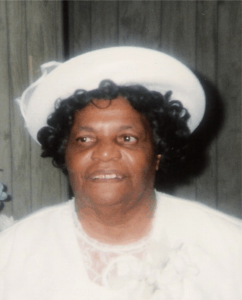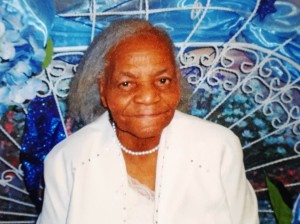
Miss Elease Spencer at age 80
The legendary Billie Holiday once remarked that “[y]ou can only get to where you at by way of where you been.”
I know that I became the person I am today not only because of my own journey but also because of the journeys of my ancestors. I am deeply indebted to my ancestors and during Women’s History Month, I want to pay homage to my oldest maternal aunt, Elease Spencer, and her indomitable spirit that has allowed her to survive and succeed in the face of illness, hardship, and discrimination.
Aunt Elease (born March 20, 1916) was the oldest surviving child born to my maternal grandparents, Joshua Spencer and Bertha Mae Best Spencer. My grandmother had suffered four (4) miscarriages prior to the birth of Aunt Elease and the entire family rejoiced when Aunt Elease was born.
From her earliest years, Aunt Elease was a survivor. As the great influenza pandemic of 1918 and 1919 swept through Georgia, both Aunt Elease and her young brother, Joshua, Jr., were stricken with the disease. Although both children were terribly ill, Aunt Elease did recover and, in keeping with the deep love for her family that she has displayed throughout her life, her first concern upon recovery was for little brother as she tearfully asked “Where is the baby?” Unfortunately, little Joshua had succumbed to the disease.
My family placed great value on religion and education and my maternal grandparents instilled in Aunt Elease a keen appreciation and desire for religious and secular knowledge.
She joined New Robbins Branch Baptist Church where her mother was a member. She would also attend St. Paul Missionary Baptist Church, where her father was a member and a deacon. She served in the Baptist Training Union (the youth department) and the Women’s Missionary Union. She was particularly interested in learning about the history of women in the early Church and shared her knowledge with her younger sisters. She learned from her mother that, because the work of caring for their families often left Black men with little time or energy for organizing and planning religious activities and events, the survival of and growth of their local Baptist church often depended on the efforts of the women.
Aunt Elease attended grammar, elementary school, and high school in segregated schools in Screven County. The schools for Black children were referred to as “colored schools” and they were often constructed poorly and did not have enough books for all of the students. The books that were available were “hand me downs” from the students at the “white schools” and were often in poor condition. However, Aunt Elease did not let either the condition of the buildings where she attended school or the lack of books or school supplies stand in the way of her desire for knowledge.
Aunt Elease graduated from Screven County Agricultural School (referred to as Sylvania Colored High School) in the spring of 1934, and, although there had been other students in her class, she was the only student to graduate that year as many of her classmates had been forced to drop out due to help support their families. Her graduation was such a momentous occasion that most of the townspeople came to see her walk across the makeshift stage.
After graduating from high school, Elease decided to pursue her dream of obtaining a college degree and becoming a teacher. She enrolled in Georgia State College (now known as Savannah State University) in Savannah, Georgia. Initially, she attended college on a part-time basis while she worked as a teacher.
Aunt Elease began teaching in a one room school in 1935; her pay was $35.00 per month. In 1937, the school board threatened to take half of her last paycheck to pay for supposedly damaged books, a common penalty imposed upon Black teachers. Aunt Elease protested and told the superintendent that before he took half of her check, he could take it all. She then threw the check on the table and walked out of the room. The school board later mailed her entire check to her. However, that fall the school board refused to assign Aunt Elease a school. It was not until January that she began teaching again, when the President of Georgia State College helped her secure a position in Hancock County. Elease’s entire family was very excited when she obtained another teaching position. Her younger brother, Brantley William (B.W.) even made up a little song of thanksgiving.
When she resumed teaching, Aunt Elease used some of the proceeds from her pay to help her parents pay to replace the wooden shutters on the windows in their home with glass windows and to wire their home for electricity. In a time when many Black families were losing land that their ancestors had purchased in the early 1900s, Aunt Elease also helped her father pay his share of the mortgage on family owned land, thereby preserving that land for future generations.
In 1943, Aunt Elease began attending college on a full-time basis. She graduated from Georgia State College in the summer of 1945 and, in so doing, became the first of her siblings and cousins to obtain a bachelor’s degree.
In 1945, after graduating from college, Elease received a two-year appointment as principal of Wilkinson County (Colored) High School. It was unusual for a woman to be appointed principal, but Aunt Elease had a college degree and many men were still away in the war. During that time, she used some of her salary to help defray some of the college expenses of her younger sister (my mother), Josie Earle Spencer, starting a tradition of older family members helping younger family members with their educational expenses.
In 1947, when her two-year appointment ended, Aunt Elease was informed that her services as principal would no longer be needed and that the position would be filled by a man. At that point, Aunt Elease returned to the classroom. In 1950, she decided that she wanted to finish her master’s degree and she attended graduate school at Boston University from 1950 to 1952. She retired from teaching in the mid-1950s.
Aunt Elease celebrated her 100th birthday on March 20, 2016. She has lived a life full of illness, hardship, and discrimination. Through it all, however, she has maintained her faith in God and her indomitable spirit. It is that spirit that inspires and motivates me to do all that God has called me to do. It is that spirit that will not let me sit idly by in the face of oppression and injustice. It is that spirit that compels me to stand with my sisters and brothers in The Church of Jesus Christ of Latter-day Saints as we seek full equality in faith.

Miss Elease Spencer at age 95






